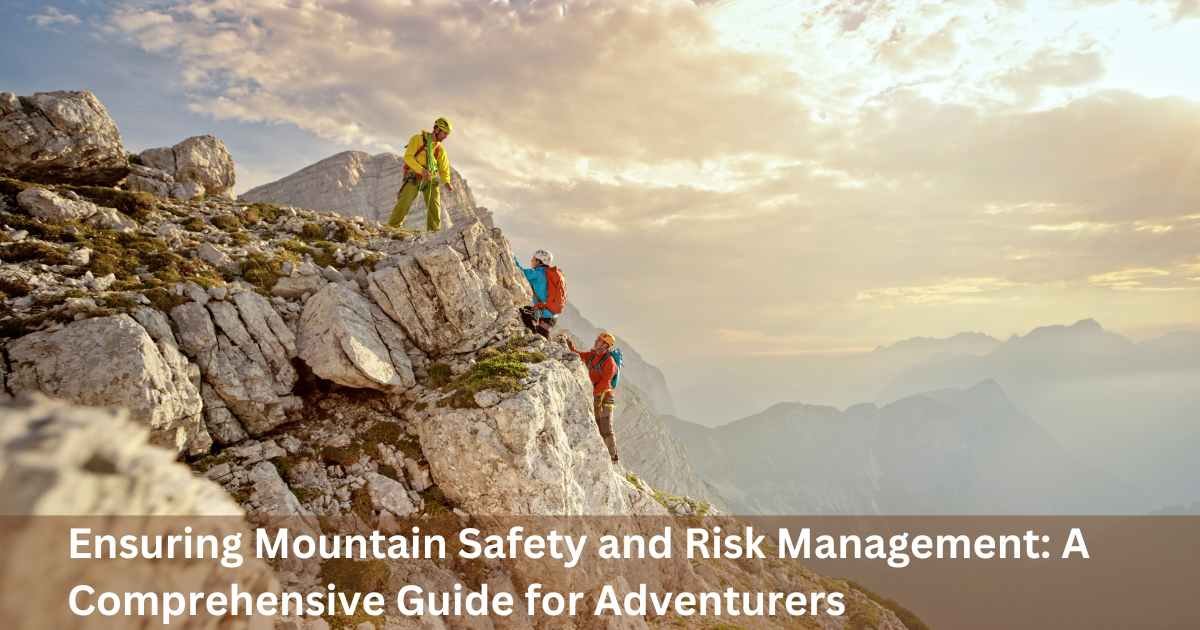
 Before setting foot on any mountain, it's crucial to research and understand the terrain thoroughly. Each mountain range presents unique challenges, including elevation, weather patterns, wildlife, and geological features. By familiarizing yourself with these aspects, you can better prepare for potential hazards and plan accordingly. Utilize topographic maps, trail guides, and local resources to gain insights into the area's characteristics.
Equipment Essentials:
Equipping yourself with the right gear is fundamental for mountain safety. Quality equipment not only enhances performance but also provides crucial protection in unpredictable conditions. Invest in sturdy hiking boots with excellent traction, layers of moisture-wicking clothing, a reliable backpack, and essentials like navigation tools, first aid kits, and emergency shelter. Additionally, carry sufficient food and water to sustain yourself throughout the journey, as dehydration and exhaustion can pose significant risks.
Navigating Weather Challenges:
Mountain weather is notoriously unpredictable, with conditions changing rapidly and dramatically. Before embarking on any expedition, check weather forecasts diligently and be prepared for sudden shifts in temperature, wind, and precipitation. Dress in layers to adapt to changing conditions easily, and always carry rain gear and insulation to stay warm and dry. In case of severe weather warnings, exercise caution and consider postponing your trip to ensure your safety.
Risk Assessment and Mitigation:
Assessing risks and implementing mitigation strategies are essential components of mountain safety. Conduct a thorough risk assessment before each outing, identifying potential hazards such as steep terrain, loose rocks, avalanches, and wildlife encounters. Develop a contingency plan and communicate it with your fellow adventurers, outlining emergency procedures and rendezvous points. Practice situational awareness throughout your journey, remaining vigilant for signs of danger and adapting your plans accordingly.
Emergency Preparedness:
Despite meticulous planning and preparation, emergencies can still arise in mountain environments. Therefore, being equipped with essential survival skills and knowledge is paramount. Learn basic first aid techniques, navigation skills, and how to signal for help in case of an emergency. Carry communication devices such as a satellite phone or personal locator beacon to summon assistance if needed. Additionally, familiarize yourself with local rescue services and emergency protocols to expedite response times.
Before setting foot on any mountain, it's crucial to research and understand the terrain thoroughly. Each mountain range presents unique challenges, including elevation, weather patterns, wildlife, and geological features. By familiarizing yourself with these aspects, you can better prepare for potential hazards and plan accordingly. Utilize topographic maps, trail guides, and local resources to gain insights into the area's characteristics.
Equipment Essentials:
Equipping yourself with the right gear is fundamental for mountain safety. Quality equipment not only enhances performance but also provides crucial protection in unpredictable conditions. Invest in sturdy hiking boots with excellent traction, layers of moisture-wicking clothing, a reliable backpack, and essentials like navigation tools, first aid kits, and emergency shelter. Additionally, carry sufficient food and water to sustain yourself throughout the journey, as dehydration and exhaustion can pose significant risks.
Navigating Weather Challenges:
Mountain weather is notoriously unpredictable, with conditions changing rapidly and dramatically. Before embarking on any expedition, check weather forecasts diligently and be prepared for sudden shifts in temperature, wind, and precipitation. Dress in layers to adapt to changing conditions easily, and always carry rain gear and insulation to stay warm and dry. In case of severe weather warnings, exercise caution and consider postponing your trip to ensure your safety.
Risk Assessment and Mitigation:
Assessing risks and implementing mitigation strategies are essential components of mountain safety. Conduct a thorough risk assessment before each outing, identifying potential hazards such as steep terrain, loose rocks, avalanches, and wildlife encounters. Develop a contingency plan and communicate it with your fellow adventurers, outlining emergency procedures and rendezvous points. Practice situational awareness throughout your journey, remaining vigilant for signs of danger and adapting your plans accordingly.
Emergency Preparedness:
Despite meticulous planning and preparation, emergencies can still arise in mountain environments. Therefore, being equipped with essential survival skills and knowledge is paramount. Learn basic first aid techniques, navigation skills, and how to signal for help in case of an emergency. Carry communication devices such as a satellite phone or personal locator beacon to summon assistance if needed. Additionally, familiarize yourself with local rescue services and emergency protocols to expedite response times.
Your Inner Hikes Calling You!
Allow Us To Call You Back !
We will reach out to you shortly.